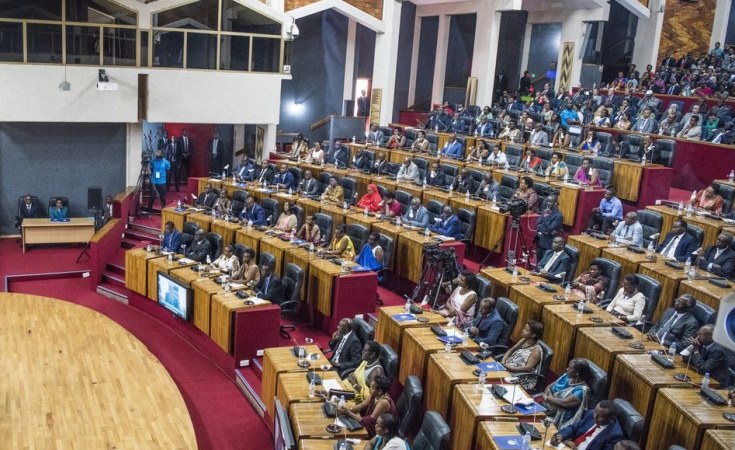The Minister of Foreign Affairs and International Cooperation, Dr Vincent Biruta, on Tuesday, December 5, signed a joint treaty with his counterpart, the United Kingdom Home Secretary, James Cleverly, as part of the efforts to strengthen Rwanda and the UK's Migration and Economic Development Partnership (MEDP), but also directly address the concerns of the Supreme Court.
Signed and announced in Kigali, Rwanda, the new treaty was hailed as a "fountain pen" towards the UK's plan to ensure that illegal migrants can be lawfully relocated to Rwanda.
The new treaty also comes nearly a month after the UK's top court ruled out the initial scheme of the partnership (MEDP), citing several challenges, but Cleverly told media in Kigali that the concerns are addressed in the new binding treaty.
Here is what you should know;
1. Rwanda, UK jointly worked on the new scheme
The new treaty, officials said, responds directly to the conclusions of the Supreme Court and presents a new long-term solution.
This, among other provisions, Cleverly pointed out, guarantees that any people sent to Rwanda to claim asylum are not at risk of being sent to a third country where they could face harm.
"This is a crucial step forward in our commitment to stopping the boats and saving lives, he added.
"Rwanda is a safe country that cares deeply about supporting refugees. It has a strong history of protecting those who need it, hosting over 135,000 asylum seekers who have found sanctuary there. I am grateful to our Rwandan partners for their willingness, dedication, and commitment to strengthening this partnership further."
"The Supreme Court recognised that changes may be delivered which would address their conclusions - this treaty responds directly to that."
The treaty also builds on two months of work between Rwanda and the UK.
2. No risk, threats to the asylum seekers
The new treaty is binding in international law and ensures that people relocated to Rwanda under the partnership are not at risk of being returned to a country where their life or freedom would be threatened - an act known as refoulement.
It also enhances the functions of the independent monitoring committee to ensure compliance with the obligations in the treaty, such as reception conditions, processing of asylum claims, and treatment and support for individuals, including up to five years after they have received a final determination of their status.
This partnership also reflects Rwanda's commitment to protecting vulnerable people, the office of the government spokesperson noted in a statement, following the signing.
"We have a proven record of offering a home to migrants and refugees from around the world. Anyone who comes to Rwanda under this agreement will be welcomed and given the safety and support they need to build new lives in our country. We believe today's treaty provides the necessary assurances that will allow the partnership to move forward."
3. Eight-member independent committee
The monitoring committee is expected to be made up of eight independent members.
The committee will also develop a system that will enable relocated individuals and legal representatives to lodge confidential complaints directly to them.
Officials are optimistic that it will have the power to set its priority areas for monitoring, and have unfettered access for completing assessments and reports. It may publish reports as it sees fit on its findings.
4. A new appeals body in Rwanda
To further bolster assurances that relocated individuals will not be returned, under the treaty, Rwanda's asylum system will be strengthened through a new appeal body.
The appeal body will consist of a Rwandan and another Commonwealth national co-president, and be composed of judges from a mixture of nationalities with asylum and humanitarian protection expertise (appointed by the co-presidents) to hear individual appeals.
"We remain steadfast in doing everything we can to stop illegal migration, and our wider, ongoing work operationally and internationally has led to crossings coming down by a third compared to last year," Cleverly said.
5. No plans to withdraw from the migration plan
Biruta said Rwanda is "very much" committed to the migration and economic development partnership, dismissing allegations that the country would withdraw from the plan.
"And this is the reason why we worked with our colleagues from the UK to address the concerns of the UK Supreme Court, while we thought they were unfounded or unfair, but we worked together just to address those concerns."
He added: "So we don't have a plan to withdraw from this collaboration. We have a plan to implement this partnership, and we remain open to just monitor the implementation and be able to adjust when necessary. So we are committed to the partnership and there is plan to withdraw."
Small boat crossings down by a third in UK
Following the signing in Kigali, UK Prime Minister Rishi Sunak announced that his country has made progress in stopping the boats, despite efforts by "criminal gangs" to deter the plan.
Sunak said that in 2022, almost 30 per cent of people arriving in small boats were from Albania, where the UK brokered a deal with the former to make it easier to deport and deter illegal migrants.
As it stands, he said, Albanian small boat crossings are down by 90 per cent.
In 2022, the number of people crossing the Channel on small boats exceeded 45,700, mainly lured into the country by criminal gangs on promises of jobs.
"The UK increased its resources for immigration enforcement, including adding more new staff. Our illegal working raids increased by almost 70 per cent, preventing vulnerable people from exploitation."
Sunak added; "We've made progress but there's more work to do. I will stop at nothing to fix this problem," Sunak announced via X post.


